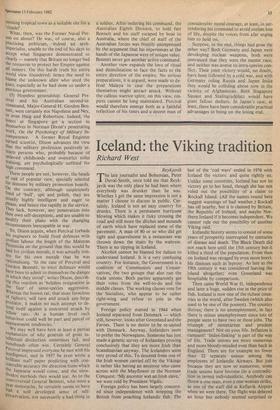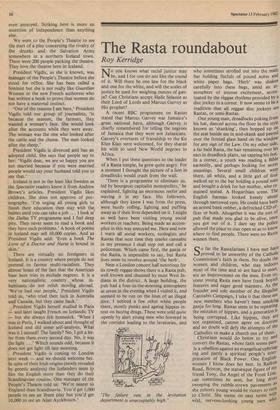Iceland: the Viking tradition
Richard West
Reykjavik
The late journalist and Bohemian, Peter Duval-Smith, once told me that Reyk- javik was the only place he had been where everybody was drunker than he was. Whether I got the same impression is not a matter I choose to discuss in public. Cer- tainly, Iceland is not an easy country for drunks. There is a permanent hurricane blowing which makes it risky crossing the road and still more the ditches and mounds of earth which have replaced some of the pavement. A man of 80 or so who did get tight and quarrelsome in a restaurant was thrown down the stairs by the waitress. There is no tipping in Iceland.
Alcohol cannot be blamed for failure to understand Iceland. It is a very confusing country. For instance, the Government is a coalition of Communists and Conser- vatives, the two groups that also run the trade unions. Both parties apparently get their votes from the well-to-do and the middle classes. The working classes vote for the Socialists, who appear to be rather right-wing and refuse to join in the government.
Foreign policy started in 1944 when Iceland separated from Denmark — which still, however, looks after Greenland and the Faroes. There is no desire to be re-united with Denmark. Anyway, Icelanders seem to prefer the Norwegians. Someone has just made a genetic survey of Icelanders proving conclusively that they are more Irish than Scandinavian anyway. The Icelanders seem very proud of this. To descend from one of the Irish women carried off by the Vikings is rather like having an ancestor who came across with the Mayflower or the Norman Conquest. 'My ancestor wag an Irish slave,' we were told by President Vigdis.
Foreign policy has been largely concern- ed since independence with stopping the British from poaching Icelandic fish. The last of the 'cod wars' ended in 1976 with Iceland the victors: and quite rightly so. Unlike some countries, Iceland has not let victory go to her head, though she has not ruled out the possibility of a claim to Rockall Island. (All the names round here suggest warnings of bad weather.) Rockall has oil nearby, but it is claimed by Britain, the Republic of Ireland, and maybe Nor- thern Ireland if it becomes independent. We cannot rule out the possibility of another Viking raid.
Icelandic history seems to consist of some years of prosperity interrupted by centuries of disease and death. The Black Death did not reach here until the 15th century but it killed a third of the population. From then on Iceland was ravaged by even more horri- ble illnesses such as leprosy. As late as the 19th century it was considered leaving the island altogether; even Greenland was hospitable by comparison.
Then came World War II, independence and later a huge, sudden rise in the price of fish. Iceland is now one of the richest coun- tries in the world, after Sweden (which also used to be one of the poorest). The country thrives; there is no unemployment, in fact there is minus unemployment since lots of people seem to have two or three jobs. The triumph of monetarism and prudent management? Not on your life. Inflation is rampant! 'Index-linking' is part of the way of life. Trade unions are more numerous and more bloody-minded even than back in England. There are for example no fewer than 32 separate unions among the employees of Icelandic Airways. But just because they are now so numerous, some trade unions have become (in a contradic- tion in terms) individualistic. Anybody can throw a one-man, even a one-woman strike, as one of the staff did at Keflavik Airport when we were there. The flight was delayed an hour but nobody seemed surprised or even annoyed. Striking here is more an assertion of independence than anything else.
We went to the People's Theatre to see the start of a play concerning the rivalry of the drunks and the Salvation Army somewhere in a northern Iceland town. There were 200 people packing the theatre. They love the theatre here in Iceland.
President Vigdis, as she is known, was manager of the People's Theatre before she stood for office. She has been called a feminist but she is not really like Guardian Woman or the new French authoress who has written a book to prove that women do not have a maternal instinct.
`One of the reasons I am here,' President Vigdis told our group of journalists, 'is because the seamen, the farmers, they wanted a woman's face. She would look after the accounts while they were away. The woman was the one who looked after the cattle and the cheese. The men looked after the sheep.'
President Vigdis is divorced and has an adopted child. She says that people say to her: `Vigdis dear, we are so happy you are not married because if you were married people would say your husband told you to say that.'
Iceland is not in the least like Sweden as the Spectator readers know it from Andrew Brown's articles. President Vigdis likes children. She does not approve of por- nography. `I'm urging all young girls to finish their education then stay with the babies until you can take a job ... I look at the Dallas TV programme and I feel deep pity. They never seem to read a book and they have such problems.' A book of poems in Iceland may sell 10,000 copies. And as President Vigdis said: 'Even a book The Love of a Doctor and Nurse is bound in skin.'
There are virtually no foreigners in Iceland. It is a country where people do not pretend to favour multi-racialism. They almost boast of the fact that the American base here tries to exclude negroes. It is a very nationalistic country whose in- habitants do not relish moving abroad. `We've had our people,' President Vigdis told us, 'who tried their luck in Australia and Canada, but they came back.'
President Vigdis herself studied in Paris — and later taught French on Icelandic TV — but she always felt homesick. 'When I was in Paris, I walked about and thought of Iceland and did some self-analysis. What was it I missed? The family? No, I got a let- ter from them every second day. No, it was the light . „ ' Which sounds odd, because it does not get light till late morning.
President Vigdis is coming to London next week — and we should welcome her. In spite of their Irish origins (newly revealed by genetic analysis) the Icelanders seem to like the English more than they do their Scandinavian cousins. One manager of the People's Theatre told us: `We're nearer to England than Scandinavia. You'd get 1,000 people to see an Ibsen play but you'd get 10,000 to see an Alan Ayckbourn.'











































 Previous page
Previous page